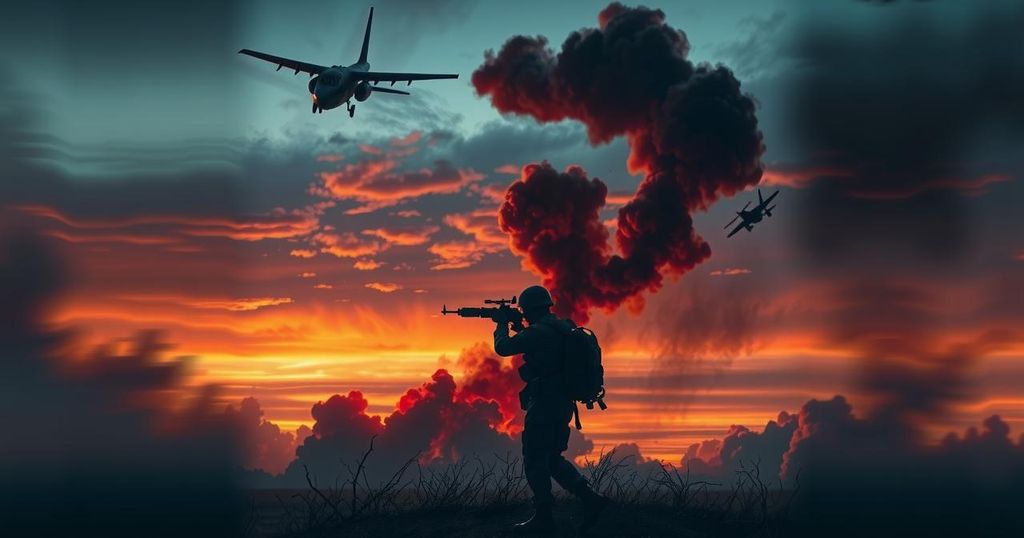U.S. Military Strikes Against Houthis: Implications for Iran and Yemen
The U.S. strikes on Yemen’s Houthis serve as a warning to Iran but risk worsening civilian suffering, which the Houthis could exploit. President Trump’s military actions aim to compel the rebels to cease their maritime aggression and demonstrate U.S. resolve. Experts warn that without a comprehensive approach, these strikes may prolong Yemen’s humanitarian crisis and alienate the civilian population.
The recent U.S. strikes on Yemen’s Houthi militia serve as a stern warning to Iran, although experts caution that it may exacerbate civilian hardships, which the rebels may exploit. President Donald Trump authorized military action against Houthi-controlled areas to compel the Iran-backed militia to halt attacks on vessels in the Red Sea and Gulf of Aden, as part of his broader strategy of maximum pressure on Iran and its affiliates.
Trump’s military strategy includes enforcing “overwhelming lethal force” after increasing sanctions on Tehran, aiming to persuade the regime to engage in direct negotiations regarding its nuclear program. Baraa Shiban, a Yemen expert, noted that the strikes are primarily aimed at Iran, emphasizing that Trump intends to demonstrate his ability to target Iranian interests as a means of negotiation through strength.
The strikes resulted in at least 31 casualties and followed the Houthis’ announcement of a renewed offensive on Red Sea shipping in response to Israel’s blockade of Gaza. There have been no reports of actual attacks on international ships post-strikes. Shiban asserted that Trump’s proactive measures could be more effective than a reactive defense strategy against potential Houthi attacks.
Local authorities in Houthi territories advised civilians to evacuate these areas, acknowledging that strikes would intensify suffering among the Yemeni populace. They predicted the conflicts to escalate further, potentially adding to Yemen’s dire humanitarian situation, which is already critical due to ongoing regional conflicts and military operations.
The Houthi political bureau condemned the U.S. actions as aggression, promising retaliation and urging civilians to follow government instructions amid potential chaos. A Yemen government official welcomed Trump’s decisive actions against the Houthis and emphasized that only a show of strength would stabilize the region and deter Iranian interference in regional affairs.
However, experts like Osamah Al Rawhani highlight that while targeting military assets may weaken the Houthis, it could simultaneously alienate civilians who do not support the group. They argue the U.S. needs to adopt a comprehensive strategy that addresses both military and political aspects, focusing on smuggling prevention and the underlying causes of the conflict to avoid prolonging Yemeni suffering.
Iran-backed Hezbollah denounced the U.S. strikes, which coincided with the recent redesignation of the Houthis as a foreign terrorist organization by Washington, overturning prior Biden policy. These military actions follow Trump’s offer to engage in nuclear negotiations with Iran’s supreme leader, Ayatollah Ali Khamenei, which was publicly dismissed by Khamenei as a tactic to sway public opinion and exert further pressure on the nation.
In summary, the U.S. strikes against the Houthis send a clear signal to Iran but may lead to increased civilian suffering in Yemen. The actions reflect Trump’s strategy to exert maximum pressure on Iran, amidst warnings from experts about the humanitarian repercussions of such military interventions. As the situation evolves, it is essential for the U.S. to consider a multifaceted approach that not only targets Houthi capabilities but also addresses the broader political and economic dynamics contributing to the ongoing conflict.
Original Source: www.thenationalnews.com




Post Comment